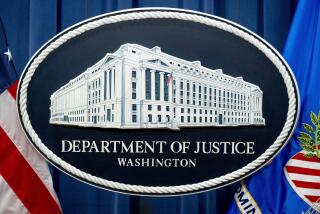Clinton Envoy Concludes Visit to N. Korea
- Share via
WASHINGTON — U.S. presidential envoy William J. Perry finished a four-day trip to North Korea on Friday, the highest-level official U.S. visit in decades, but he failed in his attempt to meet the Communist regime’s reclusive leader, Kim Jong Il.
U.S. officials said Perry was to present North Korea with a broad U.S. proposal under which Washington would consider scaling back sweeping economic and diplomatic sanctions if the North halted the deployment and export of ballistic missiles and weapons of mass destruction.
James P. Rubin, the State Department’s spokesman, said Perry met with “a wide variety of senior North Korean officials,” including high-ranking political, foreign affairs and defense experts.
“We do believe the delegation was well received and was afforded the opportunity to hear authoritative North Korean views,” Rubin said.
Rubin, who said Washington was not disappointed that Perry did not meet Kim, acknowledged that a meeting would have been “desirable.” Kim took over the impoverished but heavily armed nation after the death of his father, Kim Il Sung, in 1994.
North Korea’s government-run media gave unusual publicity to, and respectful coverage of, Perry’s visit. The official Korean Central News Agency reported that Perry gave a farewell dinner and reception for North Korean Foreign Ministry officials and the small international community in the capital, Pyongyang, on Thursday night.
Perry also rode a subway, took in a panoramic view of the capital from atop a monument, looked at rice paddies on a collective farm and saw an acrobatic show during his visit, according to footage on North Korea’s Central Broadcasting Station.
Friday night, Perry arrived outside Seoul to brief Japanese and South Korean officials about his visit. He will deliver a report to President Clinton that reviews U.S. policy toward North Korea and offers proposals to ease tensions in the region.
Robert L. Suettinger, a Korea expert at the Brookings Institution in Washington, said Perry’s trip was important as “a door-opener and a means of keeping a more or less cooperative effort ongoing.”
He said the White House should not “take umbrage” at Kim’s failure to meet with Perry. “He’s their exalted leader, and Perry’s just a former Defense secretary,” he said.
“However these negotiations go,” Suettinger added, “one thing you can say with certainty is they will be protracted.”
Rubin said a team of 14 U.S. experts who inspected a suspected nuclear weapons development site built into the side of a mountain had found it empty.
“The underground portion of the site is a large empty tunnel complex,” Rubin said. “Construction was unfinished, and no equipment was present.”
Rubin said further analysis is underway to determine the purpose of the “hole in the ground.” But he said inspectors were convinced that North Korea did not dismantle a “massive technological facility” before the U.S. team arrived last week.
“So I don’t see how any wool could be pulled over our eyes when there wasn’t any wool,” he said.
News reports last summer that the vast complex was being dug to secretly house a plutonium reprocessing facility sparked intense concern on Capitol Hill that North Korea was violating its 1994 agreement to freeze nuclear weapons development in exchange for two light-water nuclear reactors and other assistance.
More to Read
Sign up for Essential California
The most important California stories and recommendations in your inbox every morning.
You may occasionally receive promotional content from the Los Angeles Times.














